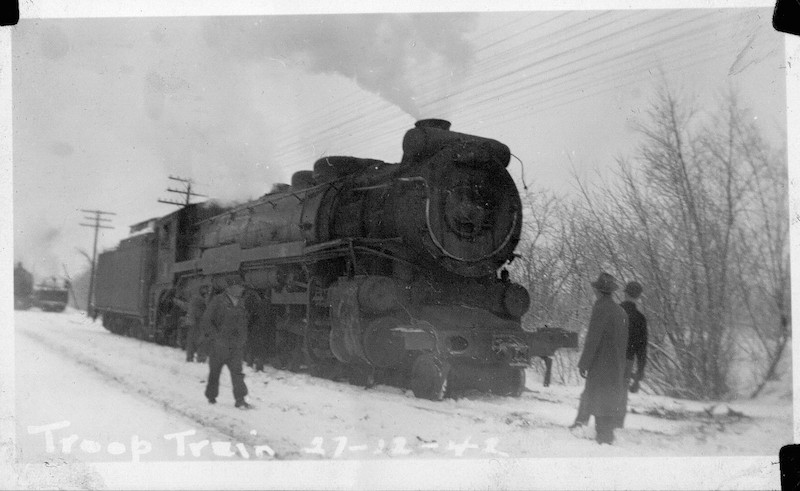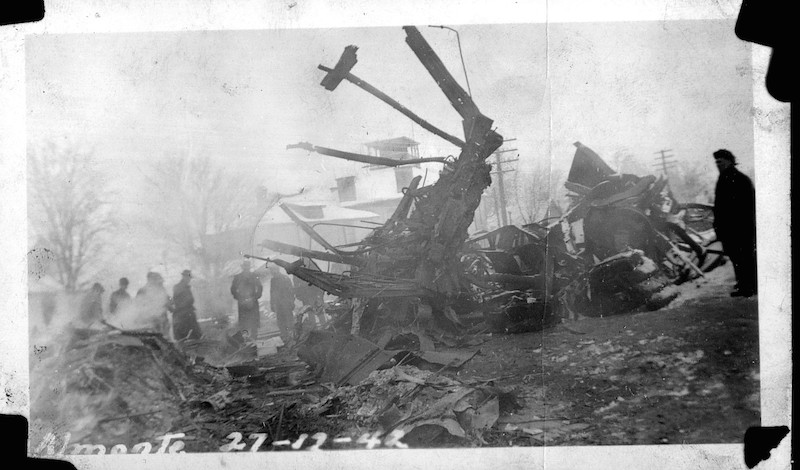The Night the War Came to Almonte
Excitement was in the air as young soldiers filed aboard the waiting train at the station in Brandon, Manitoba. It was December 26th. The thirteen-coach troop train had left Red Deer, Alberta two days before, and already many of the coaches were full.
As one sardine said to the other, they pack us in like soldiers
William Parsons overheard as he made his way aboard. By the time the gear was stored, there was barely room to move, but nothing could dampen their spirits. For weeks, William had known he was going overseas. All the signs were there: visits to the Quartermasters stores for clothing issues (field dressings specifically) and new rounds of immunizations, before finally being told to pack and prepare to move.
And now here they were: on their way to Halifax. Smuggled booze appeared and card games began throughout the coaches, accompanied by singing and jokes. Travelling day and night, by the time they neared Almonte, they were exhausted.
As the train rounded the curve into town, William can remember the sudden squealing of the brakes, the wild lurching of the train, and the sound of the crash. Anyone standing was thrown to the floor.
Rushing to Help
There was complete confusion in the coach as they rushed to the doors, only to realize the train had come to a halt on the bridge over the Mississippi River. William felt queasy as he looked down at the churning water 35 feet below, but he followed the others as they rushed along the narrow catwalk towards the engine. This feeling was mild compared to his first sight of the wreckage.
Debris was piled high. William knew there had to be many dead and injured, but there was no sound. An eerie silence hung in the air as snowflakes fell.
It is difficult to describe how I felt in that moment. I was an innocent twenty-year old just off the farm. I had never even seen a dead body. It was like being in the midst of a nightmare.
The soldiers leapt into action, working alongside the civilians for hours, putting their field dressings to good use.
A Soldier at the Ready
Soldier Vern Gordon was reporting for duty in Ottawa on Monday morning and had boarded the packed Ottawa Valley Local at Arnprior station earlier that night. There was standing room only in the fourth coach from the rear where Vern had managed to find a space and something to grasp to keep his balance. It didn’t seem to help at the station in Almonte, when he suddenly found himself in a tangle of bodies on the floor. After apologizing to those around him and finding his feet, he made his way off the train.
As he emerged, he remembers seeing a little girl’s skirt caught near the smoke stack of the steam engine, flapping in the wind, adding to the shocking scene of debris.
He had his first aid kit in his bag and did what he could to help. Among the injured, he recognized a tall, well-dressed man who had squeezed past him earlier that night in Arnprior, making his way to the third coach from the rear. A piece of shattered wood from the coach was driven through his ankle. It was about 18 inches long and impossible to remove. Vern wrapped it with his last bandage in hopes it would stop the bleeding. He needed to get him to the hospital, but no ambulances had arrived on the scene yet. That’s when Vern noticed there were a few cars parked near the station. One had keys in it. After loading the car with injured passengers, he took them to a triage unit being set up in the curling rink. Cots and piles of blankets were already set up when he arrived.
In Thanks of Service
William and Vern were just two of the soldiers who rushed to help that night. Two others from the troop train were awarded British Empire Medals for their actions. Sergeant John Wesley Gillespie provided first aid to the injured and supervised rescue parties, despite being injured himself. Private Frederick Robert Whitta provided first aid and aided doctors in major operations throughout the night, despite having no medical experience.



